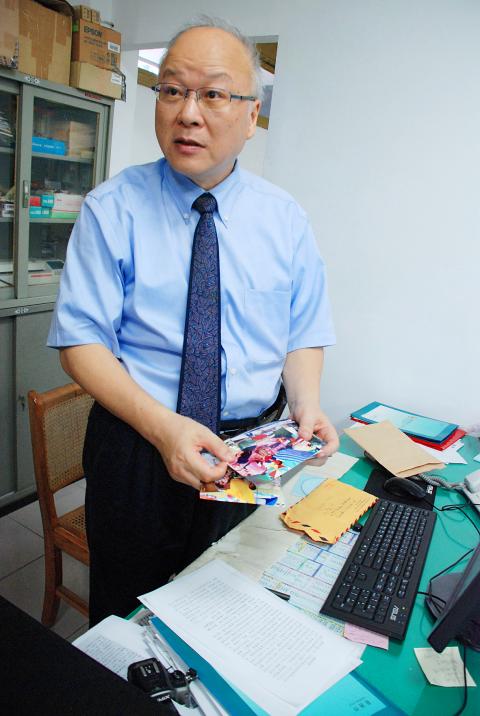Former Taiwan Provincial Government secretary for foreign affairs Kuo Kuan-ying’s (郭冠英) legal case took a surprising turn yesterday when the Taipei High Administrative Court repealed the Ministry of Civil Service’s decision to reject his application to retire and instead instructed the ministry to approve the application.
The court had not made its reasons for the ruling public as of press time last night.
Kuo was dismissed in 2009 from the now-defunct Government Information Office, which was eliminated as part of a reorganization of the Cabinet in 2012, due to commentaries referring to himself as a “high-class Mainlander,” while calling ethnic Taiwanese taibazi (台巴子, Taiwanese rednecks).

Photo: Chen Feng-li, Taipei Times
He also wrote that China should suppress Taiwanese instead of granting them political freedom once it has taken Taiwan by force.
Kuo’s dismissal carried a clause that he was ineligible to hold government office for three years.
However, Kuo was hired by the Taiwan Provincial Government as secretary for foreign affairs in 2014, but the ministry claimed the provincial government had not observed proper procedure and demanded that it provide proper documents as required under the Administrative Procedure Act (行政程序法).
The provincial government claimed the act was not applicable to Kuo’s appointment.
Kuo applied for retirement four months after being hired by the provincial government, entitling him to a NT$60,000 (US$1,900) monthly pension.
The Ministry of Justice was contacted for advice and it confirmed the eligibility of the act in Kuo’s appointment in two official notices on Jan. 30 last year, the Ministry of Civil Service said, adding that the justice ministry’s opinion was the basis for it rejecting Kuo’s retirement application.
Kuo filed an administrative lawsuit against the Ministry of Civil Service after the Public Functionary Disciplinary Sanction Commission rejected his request for an appeal.
In a telephone interview with the Chinese-language Liberty Times (the Taipei Times’ sister newspaper) yesterday, Kuo said that winning the lawsuit would only be a symbolic victory as it would not be enough to support his daily expenses should civil servants pensions be cut by the government as part of its reform of the pension system.
Kuo said the case had not been a question of his legal status as an employee of the Taiwan Provincial Government, but a matter of politics.
Kuo said he is concerned about the possibility of his pension being cut by the pension reforms committee, adding that he had joined the hunger strike held in the past few days in protest of the reforms.

RESILIENCE: Deepening bilateral cooperation would extend the peace sustained over the 45 years since the Taiwan Relations Act, Greene said Taiwan-US relations are built on deep economic ties and shared values, American Institute in Taiwan (AIT) Director Raymond Greene said yesterday, adding that strengthening supply chain security in critical industries, enhancing societal resilience through cooperation and deepening partnerships are key to ensuring peace and stability for Taiwan in the years ahead. Greene made the remarks at the National Security Youth Forum, organized by National Taiwan University’s National Security and Strategy Studies Institution in Taipei. In his address in Mandarin Chinese, Greene said the Taiwan-US relationship is built on deep economic ties and shared interests, and grows stronger through the enduring friendship between

GAINING STEAM: The scheme initially failed to gather much attention, with only 188 cards issued in its first year, but gained popularity amid the COVID-19 pandemic Applications for the Employment Gold Card have increased in the past few years, with the card having been issued to a total of 13,191 people from 101 countries since its introduction in 2018, the National Development Council (NDC) said yesterday. Those who have received the card have included celebrities, such as former NBA star Dwight Howard and Australian-South Korean cheerleader Dahye Lee, the NDC said. The four-in-one Employment Gold Card combines a work permit, resident visa, Alien Resident Certificate (ARC) and re-entry permit. It was first introduced in February 2018 through the Act Governing Recruitment and Employment of Foreign Professionals (外國專業人才延攬及雇用法),

The Ministry of Transportation and Communications yesterday said that it would redesign the written portion of the driver’s license exam to make it more rigorous. “We hope that the exam can assess drivers’ understanding of traffic rules, particularly those who take the driver’s license test for the first time. In the past, drivers only needed to cram a book of test questions to pass the written exam,” Minister of Transportation and Communications Chen Shih-kai (陳世凱) told a news conference at the Taoyuan Motor Vehicle Office. “In the future, they would not be able to pass the test unless they study traffic regulations

EUROPEAN TARGETS: The planned Munich center would support TSMC’s European customers to design high-performance, energy-efficient chips, an executive said Taiwan Semiconductor Manufacturing Co (TSMC, 台積電), the world’s largest contract chipmaker, yesterday said that it plans to launch a new research-and-development (R&D) center in Munich, Germany, next quarter to assist customers with chip design. TSMC Europe president Paul de Bot made the announcement during a technology symposium in Amsterdam on Tuesday, the chipmaker said. The new Munich center would be the firm’s first chip designing center in Europe, it said. The chipmaker has set up a major R&D center at its base of operations in Hsinchu and plans to create a new one in the US to provide services for major US customers,